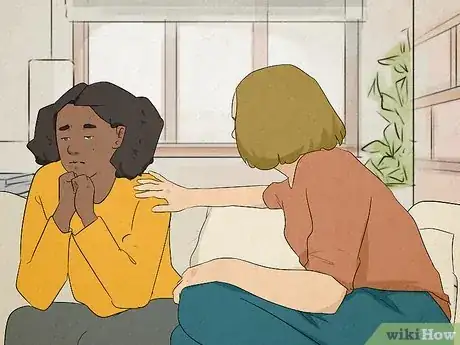This article was co-authored by Ken Breniman, LCSW, C-IAYT and by wikiHow staff writer, Nihal Shetty. Ken Breniman is a Licensed Clinical Social Worker, Certified Yoga Therapist and Thanatologist based in the San Francisco Bay Area. Ken has over 15 years experience of providing clinical support and community workshops utilizing a dynamic combination of traditional psychotherapy and yoga therapy. He specializes in eclectic non-denominational yoga guidance, grief therapy, complex trauma recovery and mindful mortal skills development. He has a MSW from Washington University in St. Louis and an MA Certification in Thanatology from Marian University of Fond du Lac. He became certified with the International Association of Yoga Therapists after completing his 500 training hours at Yoga Tree in San Francisco and Ananda Seva Mission in Santa Rosa, CA.
This article has been viewed 55,865 times.
Has someone close to you lost their mom and you aren’t sure what to say? Situations like this are emotionally tricky, but offering kind words and support can really make a huge difference when trying to help someone who’s grieving. If you’re wondering what to say when someone’s mom dies, we’ve got you covered with the most effective condolence messages. Read on for our complete guide.
Steps
“I’m so sorry for your loss.”
-
A simple condolence can be very effective. It’s always appropriate to offer someone experiencing grief a classic and thoughtful expression of your sympathy. For instance, try saying something straightforward, like:[1] X Research source
- “I’m wishing you a lot of strength in this difficult time.”
- “Sharing in your sadness as you remember your mom.”
- “You and your family are in my thoughts.”
“I can’t imagine what you must be going through.”
-
Acknowledge that your friend is going through unbelievable grief. Even if you’ve experienced the death of someone close to you in the past, it’s best not to bring this up unless you’re asked about it. Everyone’s experience of grief is unique, so tell your friend that even if you can’t understand exactly how they’re feeling, you know it must be hard. Say something like:[2] X Research source
- “I might not know what you’re going through, but I know it must be really, really hard.”
- “I’m sure you must be feeling a lot of emotions, and that making sense of them is probably really difficult.”
- “I know you must be experiencing so much pain, and that you’ve lost someone really important.”
“I’m here for you, for as long as you need.”
-
Signal your support for the long haul. Even if others move on after the funeral, let your friend know that you plan on sticking around for them. This can really make a difference in how they feel. Make your friend a promise like one of the following, and keep your word:[3] X Research source
- “I’m always here for you. I’ll give you a call next week to check in.”
- “Whether it’s today, next month, or years from now, I’m going to be with you every step of the way.”
- “I know that you used to visit your mom on weekends. How about if I start visiting you on Saturdays?”
“Can I give you some company?”
-
Just your physical presence can be comforting. Ask your friend if they’d be willing to let you sit by their side, without pressuring them to say yes. Keep in mind that if they say no, this is okay too—it doesn’t mean they’re angry with you, just that they need space to process. You can ask your friend if they’d like company by saying something like:[4] X Research source
- “If you’re okay with some company, I’d like to sit with you for a while. How does that sound?”
- “There’s no need to talk unless you want to, but would you mind if I sat here with you for a little?”
- “Maybe we could bring some friends over—it might be nice to have some more people in the house. Would you like me to text some of our other friends?”
“Would you like to talk about it?”
-
Your friend may be looking for someone to listen. After losing their mom, your friend might need another person to talk through their emotions with. Offer them your time and attention so that they feel comfortable talking to you about what they’re going through. Let them know it’s okay to open up to you by telling them something like:[5] X Research source
- “What are you feeling right now?”
- “What memories are coming to mind about her?”
- “Tell me more about your mom, if you can.”
“I don’t know what to say.”
-
It’s okay to not have the right words when you hear tough news. Sometimes, your physical presence is enough to offer your friend comfort. Instead of struggling to say the right thing, if you don’t know how to respond to this tragic event, just focus on being there in the moment. Avoid switching the subject, and instead just mention any awkwardness head-on by saying something like:
- “I’m at a loss for words.”
- “I’m sorry that I don’t know what to say at a moment like this. Would you be okay with just sitting down together?”
- “This is really shocking news. I feel totally speechless.”
“She was an amazing person.”
-
Positive memories of your friend’s mom are a great comfort. Talking about her good qualities and any memories you have of her can mean a lot to a grieving friend. By talking to your friend about these positive aspects of their mother, you let them know that her loss is felt. Say something like:[6] X Research source
- “I’m thinking about her wonderful laugh and smile. It’s truly a blessing to have known her.”
- “Your mom was such a smart, caring, and kind person. I’ll always miss her warm hugs.”
- “I might not have gotten the chance to know her well, but she must have been incredible to have raised someone as wonderful as you.”
“I know how much she loved you.”
-
Affirming the closeness between your friend and their mom means a lot. If you’re familiar with the relationship between your friend and their mom and know that it was a positive one, let them know that you could see how connected they were. This can help your friend feel affirmed in their grief. Say something like:[7] X Research source
- “It was always so clear how much you both meant to each other.”
- “She loved being your mom.”
- “You were always her pride and joy.”
“I know she’s looking out for you right now.”
-
A spiritual friend would appreciate this expression of care. Your friend may feel comforted by hearing that they still have a connection with their mother, even after death. If you know that your friend doesn’t believe in any sort of afterlife, it’s better to stay away from saying something like this. However, if they seem open to this idea, tell them something like:[8] X Research source
- “She’ll always be with you.”
- “Your mother is always going to protect you, no matter what.”
- “Your mom’s love for you is too strong to be cut short by her death.”
“What would you like for dinner? I’ll drop off some food.”
-
An offer of practical support can be a great help. After the death of their mother, your friend may be feeling overwhelmed while juggling their grief, daily responsibilities, and arrangements for the funeral. Instead of an open-ended “How can I help?”, it’s better to make a specific, practical offer, like:
- “Can I stop by and help you tidy up around the house? I know it’s tough to keep track of chores at a time like this.”
- “If you need someone to help take care of your kids/pets, just let me know.”
- “I can make the calls for the funeral arrangements. We’ll get through this together.”
“Thanks for sharing these photos.”
-
Responding to your friend’s social media posts helps them feel supported. After the death of a loved one, your friend might choose to post about them on Facebook, Instagram, or another social media platform. Your friend may be making these posts as a way of seeking support from others. Meet this need by writing something like:[9] X Trustworthy Source HelpGuide Nonprofit organization dedicated to providing free, evidence-based mental health and wellness resources. Go to source
- “Thanks for setting up this memorial page for your mom. It’s wonderful to have a place where we can share our memories of her.”
- “I’m so grateful that you’ve shared your memories of your mom with us here.”
- “What a wonderful tribute to her memory. I’m wishing you so much strength.”
Our Most Loved Articles & Quizzes
You Might Also Like
 6 Ways to Respond to "What Are You Up To?"
6 Ways to Respond to "What Are You Up To?"
 How to React When Someone Blocks You
How to React When Someone Blocks You

 What Does X Mean when Texting? From Warm Wishes to Playful Kisses
What Does X Mean when Texting? From Warm Wishes to Playful Kisses
 Short & Long Ways to Respond to “How Have You Been?”
Short & Long Ways to Respond to “How Have You Been?”

 13 Telltale Signs Someone Doesn't Respect You
13 Telltale Signs Someone Doesn't Respect You


 Different Ways to Thank Someone for Contacting You
Different Ways to Thank Someone for Contacting You

 How to Invite a Girl over to Your House (Move a Date to Your Place)
How to Invite a Girl over to Your House (Move a Date to Your Place)

References
- ↑ https://www.vumc.org/health-wellness/news-resource-articles/what-do-i-say-when-someone-grieving
- ↑ https://www.vumc.org/health-wellness/news-resource-articles/what-do-i-say-when-someone-grieving
- ↑ https://www.fatherly.com/love-money/what-to-say-to-someone-who-lost-a-parent/
- ↑ https://www.self.com/story/help-friend-suicide-loss-survivor
- ↑ https://www.fatherly.com/love-money/what-to-say-to-someone-who-lost-a-parent/
- ↑ https://www.self.com/story/help-friend-suicide-loss-survivor
- ↑ https://www.psychnewsdaily.com/condolences-how-to-write-a-condolence-message/
- ↑ https://www.psychnewsdaily.com/condolences-how-to-write-a-condolence-message/
- ↑ https://www.helpguide.org/articles/grief/bereavement-grieving-the-death-of-a-loved-one.htm
About This Article

























































